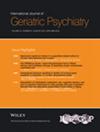Recorded Loneliness and Adverse Outcomes in Older Acute Care Inpatients Receiving Psychiatric Assessment
Abstract
Objectives
We investigated the prevalence of loneliness recorded during assessment of general hospital inpatients by older adult liaison psychiatry services and its associations with level of subsequent hospitalisation, emergency presentation and mortality.
Methods
Data were drawn from a large south London mental healthcare provider of older adult liaison psychiatry services to four acute general hospitals. The sample comprised all patients receiving assessments from these services from 2007–2017. Recorded loneliness was ascertained from text fields via a bespoke natural language processing algorithm and, via a linkage with national hospitalisation data, was investigated as a risk factor for repeat emergency department (ED) attendance, inpatient days in the subsequent 12 months, and mortality.
Results
In 11,631 patients assessed, loneliness was recorded in 11.2%. After adjustment for a range of demographic and health covariates, recorded loneliness was associated with an increased risk of ED attendance, but with lower mortality and, in survivors, with fewer hospitalisation days over a 12-month follow-up.
Conclusions
Loneliness is recorded in over 10% of inpatients assessed by older adult liaison services and is likely to be present in substantially more. Lack of recording in more severe illness and/or cognitive disorders may explain associations with lower mortality and hospitalisation days. Its association with higher likelihood of repeat ED attendance suggests that loneliness should be considered more routinely in clinical assessments, possibly with formal screening.

 求助内容:
求助内容: 应助结果提醒方式:
应助结果提醒方式:


